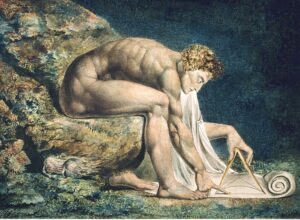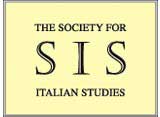University of Oxford, 2 December 2023
Organised by Frances Clemente (University of Oxford), Gennaro Ambrosino (University of Warwick), and Jacopo Francesco Mascoli (University of Warwick)
Conference report
William Blake Newton (Wikimedia Commons)
The PG Colloquium, Scientific and Technological Imaginaries in Italian Literature and Culture hosted by the University of Oxford on December 2, saw the participation of many PhD students (20), Early Career Researchers and experienced academics (3) in Italian Studies from the UK, Ireland, France, Italy, Spain and the US.
The event was co-organised by two PhD students from the University of Warwick (Gennaro Ambrosino and Jacopo Francesco Mascoli) and one PhD student from the University of Oxford (Frances Clemente), sponsored by the School of Modern Languages and Cultures (University of Warwick), the Faculty of Medieval and Modern Languages (University of Oxford), and the Society for Italian Studies, with its Postgraduate Representatives Dario Galassini, Elisa Vivaldi, and Silvia Vari. The event represented the first in person PG Colloquium since 2019, and its purpose was to give the new generations of researchers in Italian Studies a space to present the latest outcomes of their research in front of peers and experienced researchers, while also building up a sense of community. Panels included a wide variety of topics related to Italian Studies (e.g., film, theatre, 19th and 20the century literature, translation, comics, arts, and history).
The conference consisted of five panels, for a total of sixteen papers, and one keynote lecture. To encourage dialogue and provide valuable feedback, all panels consisted of fifteen-minute papers and fifteen-minute of Q&A session, chaired and introduced by the organisers and the PG representatives.
The event started with the first panel, Technology, the Scientific Revolution and Modern Anxieties in Italian Film and Drama Studies, chaired by Jacopo Francesco Mascoli (University of Warwick), with papers by Margherita Moro (University of Udine), Nicolò Dimasi (Autonoma University of Madrid), and Anna Saroldi (University of Oxford). Panel two, Science and Literature in the Italian Long 19th Century, was chaired by Gennaro Ambrosino (University of Warwick) and saw the participation of Enrica Leydi (University of Warwick), Dr. Marta Arnaldi (University of Oslo-University of Oxford), Michela Sereni (University of Galway). Then, Prof. Fabio Camilletti (University of Warwick) delivered his rich and fascinating keynote lecture entitled Dante and the Ouija Board. How Spirit Mediums Invented GPT and chaired by Dario Galassini (University of Cork).
The second part of the day started with panel three, Science and Literature in the 20th and 21st Italian Centuries, chaired by Frances Clemente (Oxford), with papers by Domenico Fadda (University for Foreigners of Perugia) and Emanuele Stefanori (University of North Carolina at Chapell Hill), Laura Pergola (University of Turin), and Francesca Ippoliti (University of Rome ‘Tor Vergata’-University of Lausanne).
The fourth and fifth panels followed. They were respectively entitled Dystopia, Queerness and Machine Translation in Italian Comics and Scientific and Technological Imaginaries in Italian Visual Arts and were chaired by Silvia Vari (Warwick) and Elisa Vivaldi (Edinburgh), with papers by Ugo Russo (University of Lorraine), Alice Parrinello (University of Oxford), Laura Bonella (University of Greenwich, Anna Bernante (Ca’ Foscari University), Costanza Paolillo (New York University), Marta Borghi (Royal Holloway London).
The event successfully reached its purpose to give voice to young researchers in the field of Italian Studies in the UK, Ireland, Italy, France, Spain and the US, showing their contributions to new and existing scholarship.


